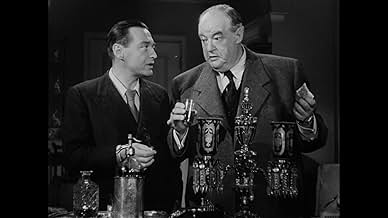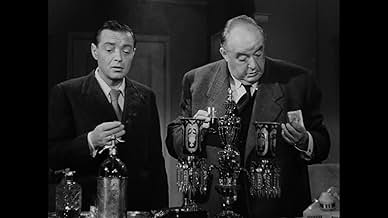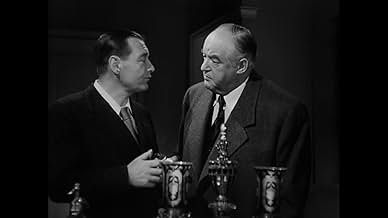IMDb RATING
6.9/10
2.8K
YOUR RATING
Three strangers, each dealing with a serious problem, share a sweepstakes ticket which they wished upon together before a Chinese idol.Three strangers, each dealing with a serious problem, share a sweepstakes ticket which they wished upon together before a Chinese idol.Three strangers, each dealing with a serious problem, share a sweepstakes ticket which they wished upon together before a Chinese idol.
- Director
- Writers
- Stars
- Awards
- 4 wins total
Norman Ainsley
- Mr. Giesing
- (uncredited)
Edward Biby
- Man on the Street
- (uncredited)
Benny Burt
- Drunken Stranger
- (uncredited)
John Burton
- Narrator
- (uncredited)
Woodrow Chambliss
- Man in Pub
- (uncredited)
- Director
- Writers
- All cast & crew
- Production, box office & more at IMDbPro
Featured reviews
One of the most unusual facets of the movie that struck me was the gowns/dresses designed for the lead actress--they stood out in this black and white movie making a not-so-tall Geraldine Fitzgerald look tall and elegant. Very few films have costume designs that out-do the performances--this film is one that achieves this unusual distinction.
Equally unusual was the written prologue for the film on the statue. It wreaked of populist myths of the Orient and then ended with the statement that the film's location was London. One expected British mannerisms and accents and its distinctive transport--but the only reasons for the choice of the locations seemed to be the legal system, the law on Trusts, the pubs, the mention of Canada being far away, the South African mines, and the solicitor's office. The rest was distinctly American. Curious stuff.
The film was equally curious for another factor: two women Icey and Janet look disturbingly similar, two men look considerably alike Mr Shackleford and Mr Fallon, save for their difference in height. Was there some reason for this or was this a coincidence.
Apart from these details, the film provided much of the fare that "The Maltese Falcon" made cinema history--John Huston's screenplay and the enigmatic performances of Greenstreet and Lorre. Greenstreet did not have the brilliant lines of "Falcon" to aid him but his chortling performance is nevertheless fascinating. Lorre on the other hand provides the best performance because the grey cocktail of good and bad touches the viewer. Similarly the lead character of Fitzgerald leaves the viewer wondering whether the character deserves our sympathy or not.
At the end, the viewer is forced to see ourselves in the mirror--we are but pawns of a mightier force, and none of us is either a villain or a saint. The film quite unwittingly makes the viewer think about life. That is probably why this film ought to rate better than "The Maltese Falcon" which no doubt has more catchy dialogues but less substance.
Equally unusual was the written prologue for the film on the statue. It wreaked of populist myths of the Orient and then ended with the statement that the film's location was London. One expected British mannerisms and accents and its distinctive transport--but the only reasons for the choice of the locations seemed to be the legal system, the law on Trusts, the pubs, the mention of Canada being far away, the South African mines, and the solicitor's office. The rest was distinctly American. Curious stuff.
The film was equally curious for another factor: two women Icey and Janet look disturbingly similar, two men look considerably alike Mr Shackleford and Mr Fallon, save for their difference in height. Was there some reason for this or was this a coincidence.
Apart from these details, the film provided much of the fare that "The Maltese Falcon" made cinema history--John Huston's screenplay and the enigmatic performances of Greenstreet and Lorre. Greenstreet did not have the brilliant lines of "Falcon" to aid him but his chortling performance is nevertheless fascinating. Lorre on the other hand provides the best performance because the grey cocktail of good and bad touches the viewer. Similarly the lead character of Fitzgerald leaves the viewer wondering whether the character deserves our sympathy or not.
At the end, the viewer is forced to see ourselves in the mirror--we are but pawns of a mightier force, and none of us is either a villain or a saint. The film quite unwittingly makes the viewer think about life. That is probably why this film ought to rate better than "The Maltese Falcon" which no doubt has more catchy dialogues but less substance.
A woman entices two strangers to her home to fulfill an unusual Chinese prophecy, granting a wish... in this case, a horse race ticket that they hope to be a winner. With a screenplay by John Huston and appearances by Lorre and Greenstreet, and a figurine as a major plot device, you might expect a MALTESE FALCON retread. But this is a very different story. I hesitate to call it noir, although it does have some of the visual stylization and explores some of man's darker impulses. But it's really more of a triptych character study. The three represent different moral stances: Fitzgerald is conniving and ruthless, Greenstreet does something wrong but at least has enough decency to be conflicted about it, and Lorre is simply a carefree drunk who trusts the wrong people. I didn't count the minutes, but it felt like Lorre got the most screen time, and deservedly so. I don't know if I've ever seen a better performance from him, certainly not a more likable one. He's a charming character with a thoughtful outlook on life. His story also has the benefit of wonderful turns by Peter Whitney and especially Joan Lorring, a very appealing actress I've never seen before, but I'm delighted to see appears in a few more noirs I intended to see. Greenstreet's and Fitzgerald's plot threads are interesting as well, and the way all they come together and resolve at the end is satisfying. It's a quirky film with a very good script, quite fulfilling.
"Three Strangers" has long been a favorite film of mine, with its fascinating reference to the statue of the goddess Kwan Yin, who, in Chinese legend, opens her eyes and grants a wish to three strangers on the Chinese New Year. Geraldine Fitzgerald, Sydney Greenstreet, and Peter Lorre are the above-mentioned strangers, each with an agenda that can be easily pursued by money. So the wish is that their sweepstakes ticket win, and the agreement is that it then be entered into the horse race that follows.
Geraldine Fitzgerald's character seems sympathetic, but she reveals herself as quite obsessive and delusional as the film progresses. Greenstreet plays a crooked solicitor, and Lorre portrays a small time criminal - he's the most sympathetic character and, to my mind, gives the most memorable performance.
The film asks the question - did the meeting of the three strangers change their lives, or did events proceed as they would have? This is an unusual, absorbing, and entertaining film. I highly recommend it.
Geraldine Fitzgerald's character seems sympathetic, but she reveals herself as quite obsessive and delusional as the film progresses. Greenstreet plays a crooked solicitor, and Lorre portrays a small time criminal - he's the most sympathetic character and, to my mind, gives the most memorable performance.
The film asks the question - did the meeting of the three strangers change their lives, or did events proceed as they would have? This is an unusual, absorbing, and entertaining film. I highly recommend it.
This is one fine made movie. It has a greatly written script and a top-notch cast. It sounds like a cliché of course but it's a real shame that movies like these aren't being made and written anymore. At least not on such a commercially large scale and with such fine big name actors in it. Movies like this aren't made anymore simply because movies like this don't really sell, unless they are being made exceptionally good. It's not really a film-noir, although the movie certainly shows similarities to the atmosphere and the story also shows noir tendencies. The movie in the end is perhaps a bit too 'light' to consider it a real film-noir, also because it features quite an amount of subtle black comedy. The story is solidly constructed and focuses on three different characters and plot-lines that of course are all still connected to each other. The fine script was written by Hollywood legend John Huston. It features lots of deeper themes such as greed and jealousy. You really start to care about the characters and their problems. Something that isn't too common for a '40's genre movie. It's not always an easy movie to watch and follow so make sure you watch this movie with a clear head. The dialog might be a bit overlong by todays standards but its so fine written and delivered by the actors that you tend to look past this. The movie gets really carried by the three main characters, that equally share the screen time. I was especially impressed by Sydney Greenstreet, which also might due to the fact that he had the best- or at least most credible plot line. Peter Lorre also played a great role and gave a fine performance. Geraldine Fitzgerald was definitely the least of the three actors and she tended to overact a bit in some of the dramatic sequences. But overall her role was also really a solid one and it says something about the quality of the acting from Lorre and Greenstreet to say that Fitzgerald gave the lesser performance of the movie. Alan Napier also plays a small role. Oh man, it really seems to be that this guy is in about every 'old' movie that I watch lately. Napier received his most fame for playing the butler Alfred in the Adam West "Batman" series from the '60's. The editing of the movie was also surprisingly good and fast. Instead of long single camera sequences, the movie cuts back and forth between different camera positions in the same sequence rapidly. It gives the story speed and helps to keep you interest even during the more slow and dull moments of the movie. The fine little musical score was from acclaimed composer Adolph Deutsch, whose music suited this movie and its atmosphere really well. It's a fine good old fashioned quality movie, made with limited resources but with fine experts involved. 8/10
The time is 1938 London before the World War. A woman of mystery, Geraldine Fitzgerald, invites two perfect strangers played by Peter Lorre and Sydney Greenstreet up to her apartment. She's a believer in the ancient Chinese god of Kwan Lin and it's said that if Three Strangers wish on that deity and their's is the same wish it will be granted. In this case the wish is money and it's in the form of a sweepstakes ticket that Peter Lorre has purchased and who gives two thirds away to Fitzgerald and Greenstreet in the hope of fortune coming their way.
After this we see a glimpse of the lives of the three people. Lorre is a petty criminal who's gotten himself into a beautiful jackpot being accused of a murder that he didn't commit. Fitzgerald is a shrewish wife who stays married to an unhappy Alan Napier who just wants to be free to marry Marjorie Riordan. This is a harbinger of a role that Fitzgerald really perfected a dozen years later in Ten North Frederick. As for Greenstreet, he's a solicitor, an attorney of no great significance in the legal profession, an English version of a man whose name I was once threatened with named Abe Hecht. It's now become a synonym for cheap shysters with me. Anyway Greenstreet's the trustee of an estate he's been dipping into. He wants to make a financial killing real bad because he thinks that money will buy him respectability which he craves like nothing else.
The film is like a 90 minute version of a Twilight Zone episode, but that's not a putdown because some really classic stuff was done on that program. The script was written by Howard Koch and John Huston and directed by Jean Negulesco. I'm surprised Huston did not want to direct this one himself, but Jean Negulesco got some of the best performances that members of the cast ever gave on screen, especially from the three leads.
Notice no really big movie names are in this cast, no leading men screen legends. That may have been an asset to the film because it concentrates on the story and the characters created. The ironic fates of all three of the sweepstakes ticket sharers could have come right out of the imaginative mind of Rod Serling. And Peter Lorre is actually allowed a little romance in a movie. That alone makes Three Strangers absolutely priceless.
Three Strangers is a B picture gem, one of those low budget sleepers that Hollywood puts out to great critical acclaim that turn a profit because of the low budget. And this review is dedicated to that attorney Abe Hecht whom I never met and to his idiot brother-in-law Morris Stetch who threatened me with him back in 1979. To see if Greenstreet obtains the status of a Clarence Darrow and rises from Abe Hechtdom, don't miss Three Strangers.
After this we see a glimpse of the lives of the three people. Lorre is a petty criminal who's gotten himself into a beautiful jackpot being accused of a murder that he didn't commit. Fitzgerald is a shrewish wife who stays married to an unhappy Alan Napier who just wants to be free to marry Marjorie Riordan. This is a harbinger of a role that Fitzgerald really perfected a dozen years later in Ten North Frederick. As for Greenstreet, he's a solicitor, an attorney of no great significance in the legal profession, an English version of a man whose name I was once threatened with named Abe Hecht. It's now become a synonym for cheap shysters with me. Anyway Greenstreet's the trustee of an estate he's been dipping into. He wants to make a financial killing real bad because he thinks that money will buy him respectability which he craves like nothing else.
The film is like a 90 minute version of a Twilight Zone episode, but that's not a putdown because some really classic stuff was done on that program. The script was written by Howard Koch and John Huston and directed by Jean Negulesco. I'm surprised Huston did not want to direct this one himself, but Jean Negulesco got some of the best performances that members of the cast ever gave on screen, especially from the three leads.
Notice no really big movie names are in this cast, no leading men screen legends. That may have been an asset to the film because it concentrates on the story and the characters created. The ironic fates of all three of the sweepstakes ticket sharers could have come right out of the imaginative mind of Rod Serling. And Peter Lorre is actually allowed a little romance in a movie. That alone makes Three Strangers absolutely priceless.
Three Strangers is a B picture gem, one of those low budget sleepers that Hollywood puts out to great critical acclaim that turn a profit because of the low budget. And this review is dedicated to that attorney Abe Hecht whom I never met and to his idiot brother-in-law Morris Stetch who threatened me with him back in 1979. To see if Greenstreet obtains the status of a Clarence Darrow and rises from Abe Hechtdom, don't miss Three Strangers.
Did you know
- TriviaAccording to Robert Osborne of TCM, this film was at one point intended to be a sequel to Le faucon maltais (1941). Following the success of that film, Warner Bros. wanted to make a sequel. "Falcon" writer/director John Huston said he'd previously written an un-filmed script for Warner Bros. that would be appropriate and would only require the character names to be changed to the Humphrey Bogart, Sydney Greenstreet and Mary Astor characters. However, Warner Bros. discovered they did not own the rights to the characters except for their appearance in "The Maltese Falcon."
- GoofsArbutny's outer office door identifies him as a solicitor, one specific type of lawyer in the UK. He receives a letter inviting him to join the Barristers Club which would be only open to barristers. The two types of lawyers serve different functions and have separate governing bodies in the UK.
- Quotes
Johnny West: Taken in sufficient quantities, liquor will make you intoxicated.
- Alternate versionsAlso available in a computer colorized version.
- ConnectionsFeatured in Frances Farmer Presents: Three Strangers (1959)
- SoundtracksWaltz No. 15 in A-flat major Op. 39
(uncredited)
Music by Johannes Brahms
Played on the piano by Johnny
Details
Box office
- Budget
- $457,000 (estimated)
- Runtime
- 1h 32m(92 min)
- Color
- Aspect ratio
- 1.37 : 1
Contribute to this page
Suggest an edit or add missing content

































